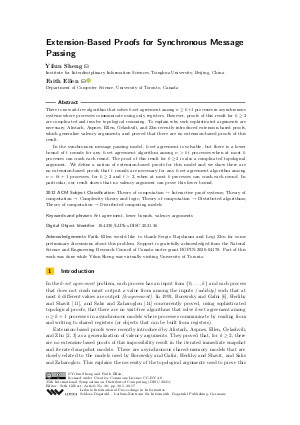Extension-Based Proofs for Synchronous Message Passing
Authors
Yilun Sheng,
Faith Ellen 
-
Part of:
Volume:
35th International Symposium on Distributed Computing (DISC 2021)
Part of: Series: Leibniz International Proceedings in Informatics (LIPIcs)
Part of: Conference: International Symposium on Distributed Computing (DISC) - License:
 Creative Commons Attribution 4.0 International license
Creative Commons Attribution 4.0 International license
- Publication Date: 2021-10-04
File

PDF
LIPIcs.DISC.2021.36.pdf
- Filesize: 0.64 MB
- 17 pages
Document Identifiers
Subject Classification
ACM Subject Classification
- Theory of computation → Interactive proof systems
- Theory of computation → Complexity theory and logic
- Theory of computation → Distributed algorithms
- Theory of computation → Distributed computing models
Keywords
- Set agreement
- lower bounds
- valency arguments
Metrics
- Access Statistics
-
Total Accesses (updated on a weekly basis)
0PDF Downloads0Metadata Views
Abstract
There is no wait-free algorithm that solves k-set agreement among n ≥ k+1 processes in asynchronous systems where processes communicate using only registers. However, proofs of this result for k ≥ 2 are complicated and involve topological reasoning. To explain why such sophisticated arguments are necessary, Alistarh, Aspnes, Ellen, Gelashvili, and Zhu recently introduced extension-based proofs, which generalize valency arguments, and proved that there are no extension-based proofs of this result. In the synchronous message passing model, k-set agreement is solvable, but there is a lower bound of t rounds for any k-set agreement algorithm among n > kt processes when at most k processes can crash each round. The proof of this result for k ≥ 2 is also a complicated topological argument. We define a notion of extension-based proofs for this model and we show there are no extension-based proofs that t rounds are necessary for any k-set agreement algorithm among n = kt+1 processes, for k ≥ 2 and t > 2, when at most k processes can crash each round. In particular, our result shows that no valency argument can prove this lower bound.
Cite As Get BibTex
Yilun Sheng and Faith Ellen. Extension-Based Proofs for Synchronous Message Passing. In 35th International Symposium on Distributed Computing (DISC 2021). Leibniz International Proceedings in Informatics (LIPIcs), Volume 209, pp. 36:1-36:17, Schloss Dagstuhl – Leibniz-Zentrum für Informatik (2021)
https://doi.org/10.4230/LIPIcs.DISC.2021.36
BibTex
@InProceedings{sheng_et_al:LIPIcs.DISC.2021.36,
author = {Sheng, Yilun and Ellen, Faith},
title = {{Extension-Based Proofs for Synchronous Message Passing}},
booktitle = {35th International Symposium on Distributed Computing (DISC 2021)},
pages = {36:1--36:17},
series = {Leibniz International Proceedings in Informatics (LIPIcs)},
ISBN = {978-3-95977-210-5},
ISSN = {1868-8969},
year = {2021},
volume = {209},
editor = {Gilbert, Seth},
publisher = {Schloss Dagstuhl -- Leibniz-Zentrum f{\"u}r Informatik},
address = {Dagstuhl, Germany},
URL = {https://drops.dagstuhl.de/entities/document/10.4230/LIPIcs.DISC.2021.36},
URN = {urn:nbn:de:0030-drops-148380},
doi = {10.4230/LIPIcs.DISC.2021.36},
annote = {Keywords: Set agreement, lower bounds, valency arguments}
}
Author Details
- Institute for Interdisciplinary Information Sciences, Tsinghua University, Beijing, China
Acknowledgements
Faith Ellen would like to thank Sergio Rajsbaum and Leqi Zhu for some preliminary discussions about this problem. Support is gratefully acknowledged from the Natural Science and Engineering Research Council of Canada under grant RGPIN-2020-04178. Part of this work was done while Yilun Sheng was virtually visiting University of Toronto.
References
-
Marcos Kawazoe Aguilera and Sam Toueg. A simple bivalency proof that t-resilient consensus requires t + 1 rounds. Inf. Process. Lett., 71(3-4):155-158, 1999.

-
Dan Alistarh, James Aspnes, Faith Ellen, Rati Gelashvili, and Leqi Zhu. Why extension-based proofs fail. In Proceedings of the 51st Annual ACM Symposium on Theory of Computing (STOC), pages 986-996, 2019.

-
Dan Alistarh, James Aspnes, Faith Ellen, Rati Gelashvili, and Leqi Zhu. Brief announcement: Why extension-based proofs fail. In Proceedings of the 39th ACM Symposium on Principles of Distributed Computing (PODC), pages 54-56, 2020.

-
Hagit Attiya, Armando Castañeda, and Sergio Rajsbaum. Locally solvable tasks and the limitations of valency arguments. In Proceedings of the 24th International Conference on Principles of Distributed Systems (OPODIS), volume 184 of LIPIcs, pages 18:1-18:16, 2020.

-
Hagit Attiya and Faith Ellen. Impossibility Results for Distributed Computing. Synthesis Lectures on Distributed Computing Theory. Morgan & Claypool Publishers, 2014.

-
Elizabeth Borowsky and Eli Gafni. Generalized FLP impossibility result for t-resilient asynchronous computations. In Proceedings of the 25th ACM Symposium on Theory of Computing (STOC), pages 91-100, 1993.

-
Soma Chaudhuri, Maurice Herlihy, Nancy A. Lynch, and Mark R. Tuttle. Tight bounds for k-set agreement. J. ACM, 47(5):912-943, 2000.

-
Eli Gafni. Round-by-round fault detectors: Unifying synchrony and asynchrony (extended abstract). In Proceedings of the Seventeenth Annual ACM Symposium on Principles of Distributed Computing (PODC), pages 143-152, 1998.

-
Maurice Herlihy, Sergio Rajsbaum, and Mark R. Tuttle. An overview of synchronous message-passing and topology. Electron. Notes Theor. Comput. Sci., 39(2):1-17, 2000.

-
Maurice Herlihy, Sergio Rajsbaum, and Mark R. Tuttle. An axiomatic approach to computing the connectivity of synchronous and asynchronous systems. Electron. Notes Theor. Comput. Sci., 230:79-102, 2009.

-
Maurice Herlihy and Nir Shavit. The topological structure of asynchronous computability. J. ACM, 46(6):858-923, 1999.

-
Nancy A. Lynch. Distributed Algorithms. Morgan Kaufmann, 1996.

-
Yoram Moses and Sergio Rajsbaum. A layered analysis of consensus. SIAM J. Comput., 31(4):989-1021, 2002.

-
Michael Saks and Fotios Zaharoglou. Wait-free k-set agreement is impossible: The topology of public knowledge. SIAM J. Comput., 29(5):1449-1483, 2000.

